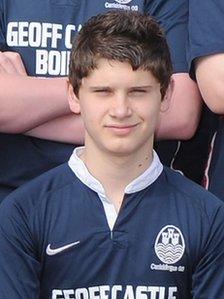Benjamin Robinson's death sparks schools alert over concussion
- Published

Benjamin Robinson died from Second Impact Syndrome
The education minister has written to schools across Northern Ireland about the dangers of concussion.
It follows the death of 14-year-old Benjamin Robinson who died from "second impact syndrome" after a school rugby match in January 2011.
The schoolboy was in several heavy tackles before collapsing near the end of the game in January 2011.
The coroner at his inquest in Belfast said this was the first such death recorded in Northern Ireland.
She told the hearing in September that it was also probably the first such case in the UK. She also highlighted the importance of recognising the symptoms of concussion.
Minister John O'Dowd said he wants to ensure that everyone involved in sports activities in schools knows the risks.
"I have written to all local schools as I want to ensure that schools are aware of the dangers of concussion and the fact that it can lead to death," he said.
"I also want to highlight Second Impact Syndrome, a rare condition which can occur when a person with symptoms related to concussion suffers a second head injury.
"Sadly this was, according to the coroner's report, the cause of Benjamin Robinson's death in 2011 following a head injury sustained whilst playing a school rugby match."
Mr O'Dowd said he wanted to implement any lessons that could be learned from Benjamin's death which, he said, had such a devastating impact on those who knew him.
Benjamin was playing for his school, Carrickfergus Grammar, at the time of the accident. He was seen holding his head before collapsing during the game against Dalriada in January 2011. He later collapsed and died in hospital from his injuries.
Mr O'Dowd said he and Carál Ní Chuilín, the minister for culture, arts and leisure, met Benjamin's parents in recent weeks. He has also discussed raising awareness with the chief medical officer.
His letter directs schools to the Concussion Recognition Tool (CRT) which contains a checklist to help coaches, teachers and parents recognise the signs of concussion.
Mr O'Dowd said everyone, including pupils, should be educated on this.
"They need to know the signs they should look for if one of their friends sustains a head injury so that they can raise their concerns with the appropriate adult," he said.
"I have therefore asked schools to consider how they can convey the messages in the CRT to pupils in the classroom in an age-appropriate manner."
- Attribution
- Published1 November 2013
- Published4 September 2013
- Published3 September 2013
- Published2 September 2013